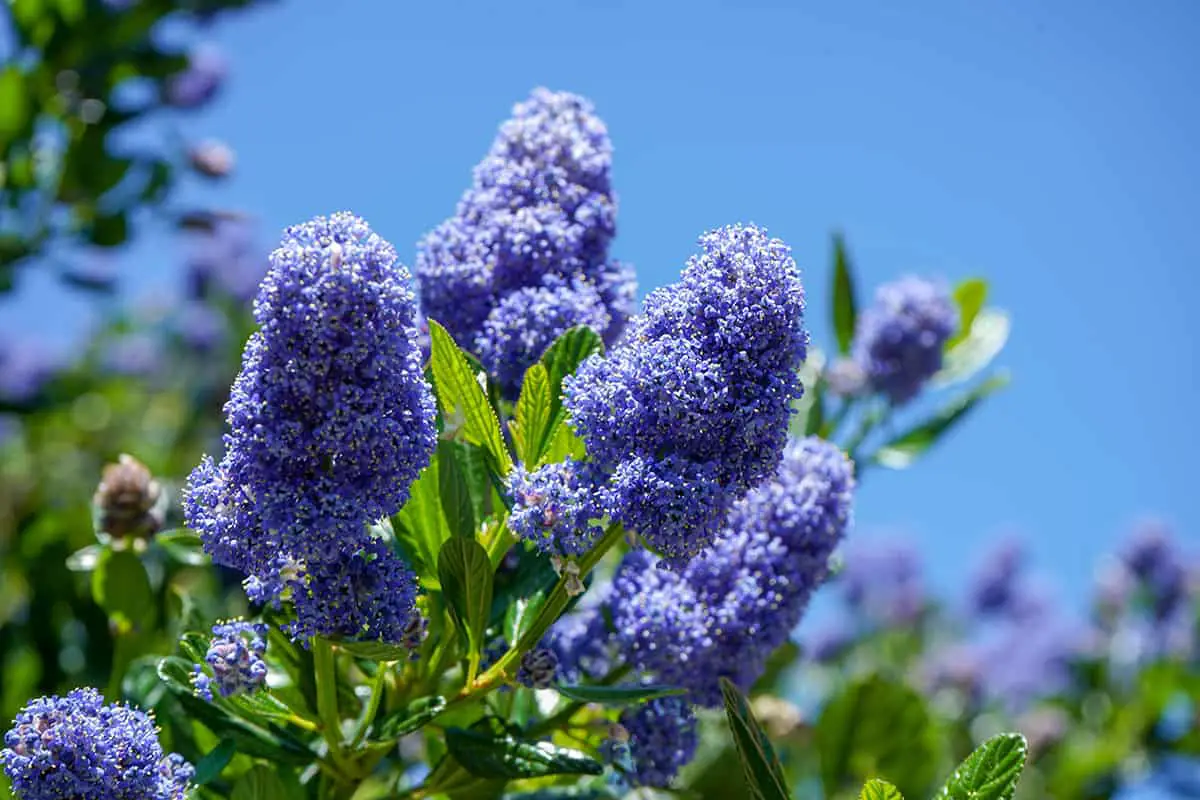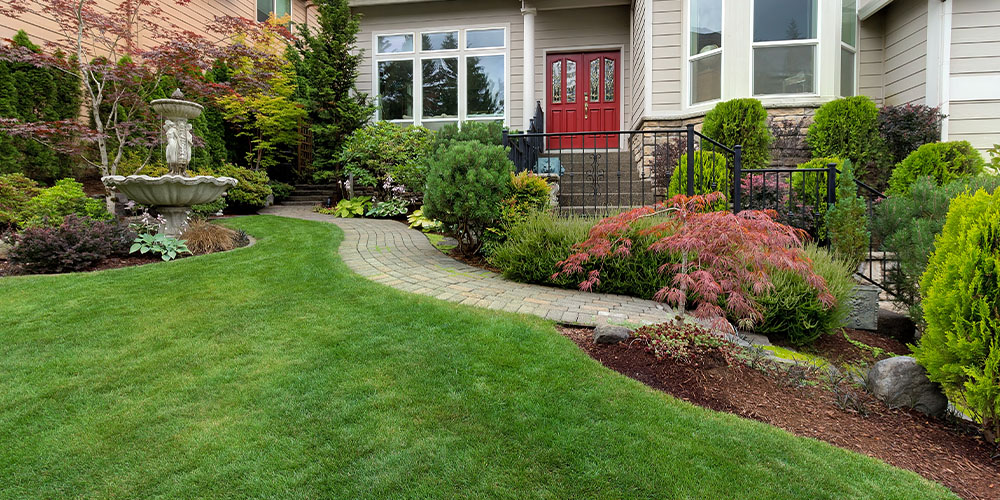Foundation shrubs serve as a long-term, permanent framework for your home. In this blog, we’ll talk about what foundation shrubs are for, how to best use them, and some of our top picks that will meet the long-term needs of your garden without compromising the look of your home.
When landscaping near foundations, pipes, or paved areas, you need shrubs with non invasive roots. The last thing you want is destructive root systems cracking your foundation or busting water lines. Many shrubs have dense fibrous roots that don’t spread out or grow down deeply. These well-behaved shrubs are perfect choices for avoiding future root problems
Below are 12 of the top shrubs with non invasive roots perfect for planting near sensitive areas,
1. Boxwood
Boxwood shrubs are beloved for their neat, rounded shape and vibrant evergreen foliage. Their fine, compact root system doesn’t usually extend past the canopy width, making them ideal around foundations and driveways. Smaller varieties like Green Velvet and Green Mountain work well in tighter spaces. Larger boxwoods can be pruned to keep their size in check.
2. Japanese Holly
Japanese hollies are classic compact shrubs with glossy green leaves. They work beautifully as foundation plants, borders, and hedges. Japanese hollies have dense noninvasive roots that don’t wander far from the base of the plant. Their proper growth prevents future root-related problems.
3. Barberry
Barberries offer brilliant color, from golden foliage to red and purple leaves. These hardy shrubs make excellent hedges and borders. Their fine feeder root systems don’t invade nearby planting areas or structures. Use dwarf varieties like ‘Crimson Pygmy’ in confined spaces. Larger types can be pruned as needed.
4. Abelia
Abelia produces dainty white blossoms that butterflies love. These semi-evergreen shrubs keep a compact rounded shape. Their shallow roots won’t disturb patios, sidewalks or pool areas. For small spaces, choose mini white-flowered ‘Rose Creek’ abelia. Larger varieties can be pruned yearly.
5. Juniper
Evergreen junipers provide unique blue-green foliage and handsome shape. Varieties like Blue Point juniper work beautifully around foundations and walkways. Their fibrous noninvasive roots prevent problems. Upright junipers make excellent screens and borders. Keep them pruned for size control.
6. Viburnum
Viburnums shine spring through fall with fragrant blossoms, colorful berries and attractive foliage. Compact types like Popcorn viburnum won’t overtake a small yard. Their restrained roots are less likely to interfere with patios or pipes. Plant viburnums as specimen plants or informal hedges.
7. Hydrangea
Bigleaf, panicle, oakleaf and smooth hydrangeas provide gorgeous seasonal interest and flowers. Though some can reach 8 feet tall, regular pruning will keep them in check. Their compact root balls don’t usually stray far or run deep, making them ideal for placement along porches, fences and walkways.
8. Azalea
Azaleas light up spring gardens with their abundant blooms in shades of pink, red, white, purple and coral. These flowering shrubs thrive in acidic well-drained soil. Dwarf evergreen azaleas work beautifully in rock gardens and beds with their shallow fibrous roots. Larger types can be pruned to keep compact.
9. Rosemary
Rosemary is a tough evergreen herb that doubles as an ornamental shrub. Its narrow root system keeps it from becoming root bound, even in a pot. Rosemary won’t invade beds or crack walkways next to it. Upright varieties work well in containers or as petite foundation plants and hedges.
10. Spirea
Spirea offers vibrant seasonal interest with white spring blooms, colored summer foliage and fall hues. These classic shrubs are easy to grow. Varieties like Anthony Waterer red spirea and Goldflame spirea have roots that tend to be compact and don’t spread far. Keep them pruned to control their size.
11. Potentilla
Potentillas are rugged flowering shrubs that bloom all summer. Their five-petaled blossoms come in sunny hues of yellow, red, pink, orange and white. These tough plants have fibrous roots that shouldn’t disrupt nearby walkways or pipes. Use potentilla as flowering groundcovers, borders or foundation plants.
12. Boxleaf Euonymus
For evergreen structure, boxleaf euonymus is a top pick. The compact shrub works well clipped into crisp formal hedges or let loose in cottage gardens. Its dense mat of fine roots won’t invade lawn or garden areas. Dwarf Japanese euonymus is ideal for edges and containers. Larger boxleaf euonymus can be sheared as needed.
Tips for Planting Near Foundations
Here are some useful tips for planting shrubs with non invasive roots around your home’s sensitive areas:
-
Allow ample space between plants and any paved areas where roots could potentially cause damage if they spread.
-
Use containment solutions like rhizome barriers and root directing mesh when planting close to foundations.
-
Prune shrubs regularly to keep growth compact and discourage large root systems.
-
Water shrubs near foundations carefully to avoid excess moisture against the structure.
-
Fertilize minimally to help restrict root overgrowth.
With the right plant picks, you can have beautiful, well-behaved shrubs that won’t overrun their space or turn into maintenance nightmares. Non invasive-rooted shrubs let you landscape problem areas with confidence.
How to Choose the Right Foundation Shrubs
There are some important tips to consider when choosing the right foundation shrubs for your home. Some rough guidelines that will help are:
- In order, start at the back and work your way forward to the front.
- Do not overcrowd—calculate, map, and allow for mature sizing.
- Allow enough space between you and the foundation of your house.
- Ensure your preferred choices do not have invasive root systems.
- Think about how much light the plant needs: full sun, part sun, full shade, or maybe all three?
- Think about when and when to bloom—you want the flowers to look good all season.
- Think about how your garden will look in the winter. Evergreens can make it more interesting all year.
- High maintenance vs. low upkeep—how much time and effort do you want to put into it after installation?
What Are Foundation Shrubs?
As stated above, foundation shrubs are used as a stable framework for your garden and home. You should give a lot of thought to which typical foundation shrubs to choose because their root systems and growth habits can affect the foundation of your home. So really, the term ”foundation shrub” has two purposes:
- When you plant shrubs close to the foundation of your home,
- Permanent shrubs that frame your home and garden
Low Maintenance Evergreen Shrubs to Grow Around Your Home!
Which plants have invasive roots?
Some plants are renowned for having invasive roots and non-shallow roots, such as Willows, Maples, and Japanese Knotweed, while others may be a surprise to you. It’s important to have an understanding of which plants have invasive roots so that you can avoid planting these close to your home. Why Can Invasive Roots Be a Problem?
How to choose a non invasive plant?
Experts recommend plants with non-invasive root systems compared to invasive ones. This is mainly because of the problematic experiences with the latter. Hence, choose a shrub with non-invasive or shallow roots as much as possible. It will free you from the burdens of protruding roots.
Should I plant a tree with non invasive roots?
Plant a tree with non-invasive roots to solve problems brought on by protruding roots. Generally, these will be small-stature trees that are not adapted to grow along waterways. Remember: Choose a plant in your zone for best results, and plant at the right time of year. Use This Step-By-Step Guide To Plant Your New Tree Or Shrub!
Which shrubs have a non-aggressive root system?
Below is a broad selection of shrubs with a non-aggressive root system: 1. Arborvitae (Thuja) This genus includes different species: eastern arborvitae (Thuja occidentalis) and western red cedar (Thuja plicata), to name a few. Both are lush and dense. If you want to form a hedge or fence, allot 3 to 4 feet interval between these shrubs.
- The Ultimate Guide to Growing Strawberries in Raised Beds - August 8, 2025
- No-Dig Garden Beds: The Easiest Way to Grow a Beautiful Garden - August 6, 2025
- How to Protect and Preserve Wood for Raised Garden Beds - August 6, 2025



